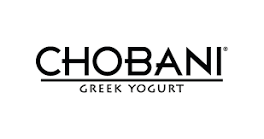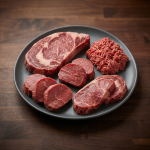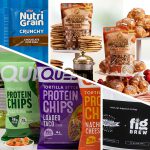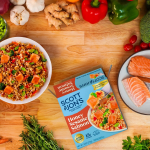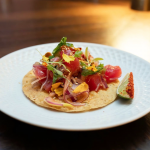Chobani, Fair Trade Announce New Dairy Certification
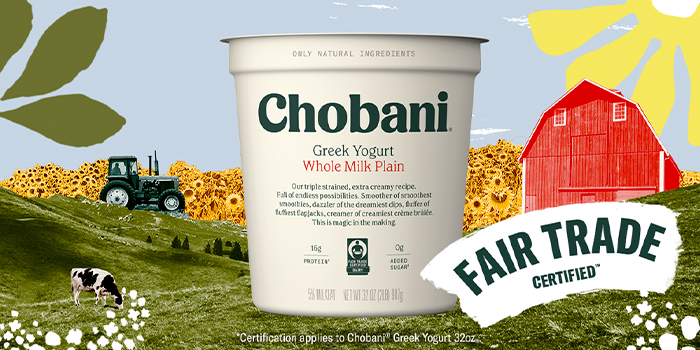
Fair Trade USA and Chobani announced yesterday the formal launch of a certification program for dairy farms and cooperatives “that provides financial premiums to dairy farmers and workers, which will help protect and empower them while raising sustainability standards,” according to a press release.
What does the certification mean?
As with other products, the Fair Trade certification process for dairy will be completed over a six to nine month period, and will require the integration of new systems and operations across the production chain, as well as ongoing auditing to ensure compliance and progress. The steps are designed to ensure product traceability, supply chain transparency and safe and equitable work conditions for employees. A portion of the proceeds from each sale of Fair Trade Certified milk— 45 cents per 100 pounds — will go towards a Community Development Fund for “democratically-selected projects and on-farm investments” for partner brands.
Unique to dairy companies participating in the Fair Trade program, 15 cents of that premium will go towards a Compliance Support fund that operators can use to make investments to come into further compliance with the standard.
“We understand that dairy is very advanced and technological and it’s very expensive to make changes, so we wanted to honor that,” said Molly Renaldo, Partnerships Manager for CPG at Fair Trade USA.
Dairy is the first animal by-product ingredient to be Fair Trade certified, and was not initially on the group’s radar prior to being approached by Chobani, Renaldo said. But she noted that on a key issue like adopting standards for animal welfare, the industry showed an ability to take strong collective action when needed.
“The dairy industry knows that [animal welfare, environmental and social impact] are issues but they are good at coming together as an entire unit and enacting change with the idea that raising the water raises all ships,” she said. “There had been so much focus on animal welfare, because it had been a huge undertaking, that we saw an opportunity to come in and lend our expertise in social welfare and impact.”
Fair Trade currently works with 1,400 brands and more than a million farmers and workers globally.
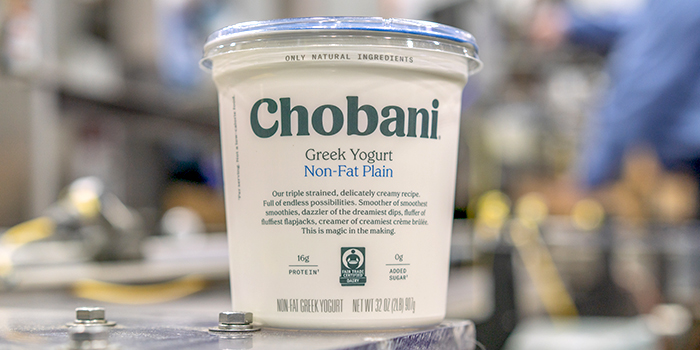
How did the process play out?
In 2019, Chobani revealed “Milk Matters,” its strategic vision for the dairy industry, built on six pillars: employee well-being, environmental stewardship, animal care, local sourcing (from farms near Chobani’s New York and Idaho processing facilities), and investing in dairy communities. As part of the initiative, Chobani announced its intention to collaborate with Fair Trade USA on creating a certification standard for dairy products.
The two parties have spent the last several years developing an Agricultural Production Standard (APS) for dairy through a pilot program with farms and cooperatives in New York and Idaho, as well as through public revision with experts and industry stakeholders, according to Renaldo.
The process hasn’t been without its critics, though; In September, non-profit group Fair World Project sent a letter to Fair Trade signed by over 30 labor rights and farmworker advocates slamming its work on a dairy standard as a “sham process” that “seeks to protect corporations without genuinely incorporating feedback from impacted communities.”
In an email, Anna Canning, Campaigns Manager at Fair World Project, said that while the group had been critical of a draft of the dairy standard, it couldn’t comment on the final version as it hasn’t been publicly released.
“We’re disappointed to see Fair Trade USA and Chobani have proceeded with launching their certification program in direct contradiction of the demands of the very people it is supposed to be benefiting – farmworkers,” she said. “We, along with 35+ labor and human rights groups, expressed concerns during the pilot project that the FTUSA program appears to be designed with no intention that the standards actually be met and with no way for its designated monitors to determine what actual working conditions are.”
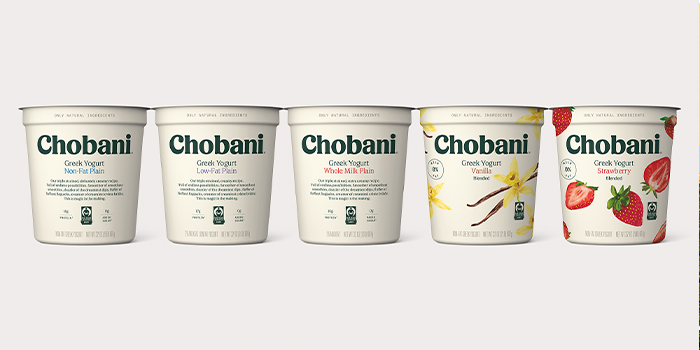
What does this mean for Chobani and the dairy industry?
Though most of the buzz around Chobani in recent months has centered around non-yogurt (and some non-dairy) innovations — coffee, creamers, oat milk — the company has also been pushing to make progress on its goal of “supporting progressive programs and practices” for its high-priority ingredients — including dairy, plus strawberries, coconuts, vanilla, almonds and palm oil — by the end of 2022. Last November, the company announced it had earned Fair Trade certification for coconuts used in its non-dairy Chobani Coconut yogurt.
The first Fair Trade Certified dairy product from Chobani will be Greek yogurt, with new versions integrated across its family of 32 oz. multi-serve tubs. Other certified products are set to follow, but Cristina Alesci, Chief Corporate Affairs Officer at Chobani, said that the company’s motivation goes beyond its own interests.
“We want to shout from the mountaintop that this certification is available to all dairy farms and cooperatives across the United States,” she said. “We’re hoping that we set an example and that others follow because that’s how we’re going to make big meaningful change.”
BevNET reached out to several dairy milk producers for comment on the new certification standard; they declined.
“Everyone knows that these things go hand-in-hand: when people are better taken care of, they are more engaged and committed to their work. When they are better trained, they treat animals better, they’re more efficient,” said Renaldo. “All of these things have to happen in tandem for the best possible outcome, and I think why it’s important that it’s not just Chobani.”

